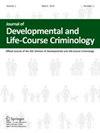队列简介:被监禁的严重暴力青年罪犯研究
IF 1.7
3区 社会学
Q2 CRIMINOLOGY & PENOLOGY
Journal of Developmental and Life-Course Criminology
Pub Date : 2021-06-30
DOI:10.4324/9780429299650-3-4
引用次数: 0
摘要
在本简介中,我们描述了被监禁的严重暴力青年罪犯研究(ISVYOS)如何利用详细的行政数据来创建一项前瞻性的纵向研究。我们还讨论了ISVYOS启动时的研究和政策背景、方法以及迄今为止学到的东西。ISVYOS包括1719名参与者,他们在青春期被监禁,并一直跟踪到成年。1998年至2002年(第一组)和2005年至2011年(第二组)期间,招募了男性和女性青年进行访谈,以衡量各种风险和保护因素、在押经历以及对司法系统的态度。后续数据包括司法系统参与程度、风险评估数据和社交网络数据。参与者的平均年龄为30.57岁(SD = 4.65)。超过90%的样本涉及成人司法系统。到目前为止,使用ISVYOS数据的研究已经解决了青少年精神病、司法系统犯罪生涯、长期和持续犯罪的风险因素以及青少年严重犯罪(如性犯罪和杀人犯罪)的成人犯罪结果的测量的可靠性和有效性。有关数据访问的询问应发送给第一作者。本文章由计算机程序翻译,如有差异,请以英文原文为准。
Cohort Profile: The Incarcerated Serious and Violent Young Offender Study
In this profile, we describe how the Incarcerated Serious and Violent Young Offender Study (ISVYOS) leveraged detailed administrative data to create a prospective longitudinal study. We also discuss the research and policy context at the time the ISVYOS was initiated, its methodology, and what has been learned so far. The ISVYOS includes 1,719 participants who were incarcerated in adolescence and followed through adulthood. Between 1998–2002 (Cohort I) and 2005–2011 (Cohort II), male and female youth were recruited for interviews that measured various risk and protective factors, experiences in custody, and attitudes towards the justice system. Follow-up data include measures of justice system involvement, risk assessment data, and social network data. Participants were an average age of 30.57 (SD = 4.65) as of December 2019. Over 90% of the sample was involved in the adult justice system. So far, research using ISVYOS data has addressed the reliability and validity of measures of psychopathy in adolescence, justice system criminal careers, risk factors for chronic and persistent offending, and the adult offending outcomes of youth involved in serious offenses (e.g., sexual offenses and homicide offense). Inquiries regarding data access should be sent to the first author.
求助全文
通过发布文献求助,成功后即可免费获取论文全文。
去求助
来源期刊

Journal of Developmental and Life-Course Criminology
CRIMINOLOGY & PENOLOGY-
CiteScore
3.00
自引率
10.50%
发文量
28
期刊介绍:
The Journal of Developmental and Life Course Criminology seeks to advance knowledge and understanding of developmental dimensions of offending across the life-course. Research that examines current theories, debates, and knowledge gaps within Developmental and Life Course Criminology is encouraged. The journal welcomes theoretical papers, empirical papers, and papers that explore the translation of developmental and life-course research into policy and/or practice. Papers that present original research or explore new directions for examination are also encouraged. The journal also welcomes all rigorous methodological approaches and orientations. The Journal of Developmental and Life Course Criminology encourages submissions from a broad array of related disciplines including but not limited to psychology, statistics, sociology, psychiatry, neuroscience, geography, political science, history, social work, epidemiology, public health, and economics.
 求助内容:
求助内容: 应助结果提醒方式:
应助结果提醒方式:


